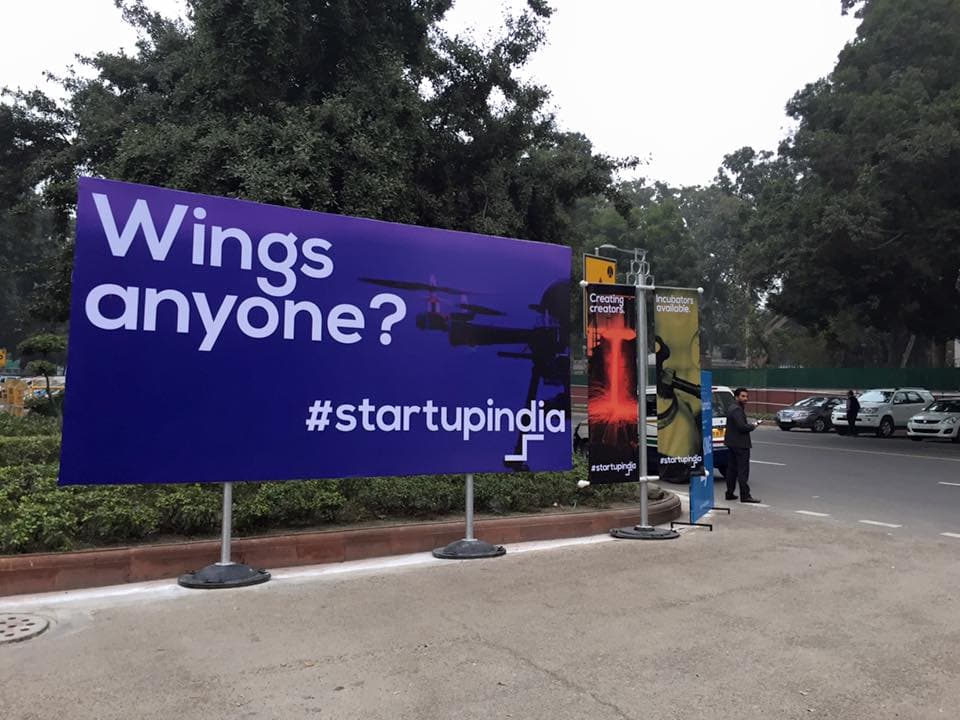
Finance Minister Arun Jaitley today kickstarted Prime Minister Narendra Modi’s Startup India mission at Vigyan Bhavan in New Delhi. Modi, will be releasing the blueprint of ‘Startup India’ programme which may include a Startups and Entrepreneurship Law to make it easier for Indian entrepreneur to set up and run their new ventures.
Will join the programme to commence the #StartupIndia movement this evening. Looking forward to interacting with start-up entrepreneurs.
— Narendra Modi (@narendramodi) January 16, 2016
The program started at 9:30 am, we bring you the live updates from the event.

9:46 AM
The first session was – Why is Innovation Important for India? Union Ministers Arun Jaitley, Nirmala Sitharaman, Onno Ruhl, Country Director, World Bank, and Amitabh Kant, Secretary, DIPP participated in the discussion.
Amitabh: Employment generation is government’s top priority.
Onnu: World Bank is excited to work with government on startup programme.
Nirmala: Entrepreneurship isn’t jugaad. Government’s fund-of-funds will help startups.
Arun: I see a large no of potential entrepreneurs at Startup India launch l am not familiar with. Not usual suspects.
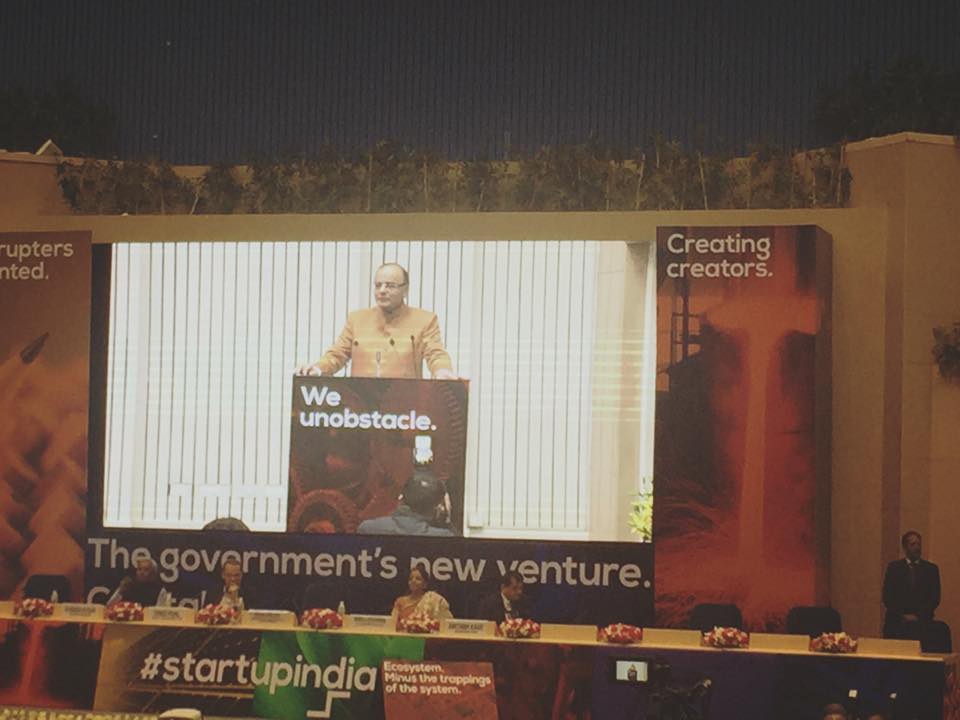
- We want to restrict the role of the State. Startup India will give freedom from the State.
- The DIPP will be a facilitator.
- Stand Up India scheme will be separately launched. It will help women and SC/ST entrepreneurs.
- More entrepreneur-friendly measures for the startups in the coming union Budget. Budget to have friendly taxation regime for startup.
- Ideal situation for startup is to have complete freedom from the government
10:35 AM
The second session was Fostering The Spirit of innovation – Masayoshi Son, founder & CEO, Softbank spoke during the session.
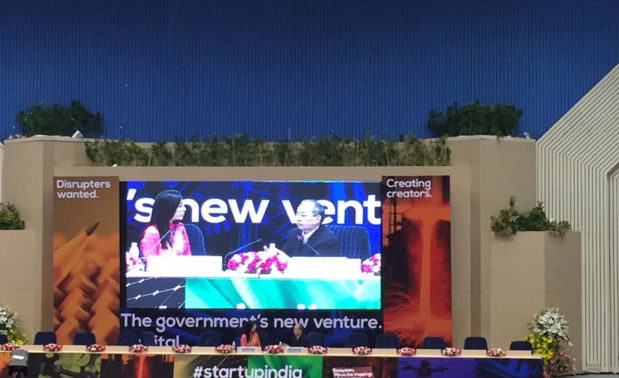
Masayoshi
- India is the country of the 21st century with Smart people, young people, IT, Sunshine and ability to speak in English.
- Last year alone Softbank invested $2 Bn in India. If we rescale, it will only go up.
- I look at the eyes and ideas of an entrepreneurs – which field and passion, before investing.
- 5-10 years from now, for startups – profit or balance sheet is not that important, customer acquisition, customer experience and overall business model needs to be created. You need a balance.
- You cannot burn money in a stupid way.
- India can be bigger in momentum than China in next 10 years; 21st century belongs to India
- For a smaller country, small market, even with capabilities – still its too small to compete against global players. India is one of the very few countries, that has a huge domestic market that can ‘fight back’.
11:00 AM
The third session was – Q&A Session – Moderated by Amitabh Kant Secretary, DIPP. On the panel were: Hasmukh Adhia Secretary Revenu; V.S Oberoi Secretary HRD; Tapan Ray Secretary Corp Affairs; Shaktikanta Das Secretary DEA; Krishnaswamy Vijay Raghavan, Secretary Biotechnology; K Shivaji Chairman and MD SIDBI; J.S Deepak Secretary, Department of Electronics and IT; Anup K. Pujari Secretary, MSME; Prashant Saran Member, SEBI.
 The major highlights of the session were
The major highlights of the session were
- K Shivaji – Out of the INR 2000 Cr fund, INR 1100 Cr has already been invested already.
- V.S Oberoi – Growth of startups should be spread across India and nnot just in metros. In the next few months, there will be a strong element of support, which will not big city oriented. This will be spread across India.
- Amitabh Kant: There are 20 department services of government, listed on e-biz platform. We’re going to tie up with 10 state governments in the next 3 months. We have hired 1000 patent examiners and we’re outsourcing things to IITs. In 18 months time, we’ll bring our patent pendency level at the same level as in the US and Japan.
- Prashant Saran – We have done away with the problems startups face. Detailed object clauses in IPO document have been changed to suit startups.
- J.S.Deepak – Our two focus areas will be – funding and incubation. We are focused on being the best in this area. We have announced the electronic development fund with the corpus of $500 Mn.
- Mohandas Pai – On startups looking at Singapore, Malaysia and US to shift their base, 6 of the 8 unicorns have redomiciled. We need to make provision to avoid startups migrating to the other places.
11:55 AM
The fourth session was “Freelancers and early stage startups: The EcoSystem Required” – The session was led by Adam Neumann of Wework & Ravi Gururaj.
Adam Neumann
- We’re coming to India sooner than later. We’re going to have a local brand with a global playbook. We’re looking for CEO, CFO, COO and everything that comes in between.
- The more money you raise the more responsibility you put on your shoulders, the more you need to deliver.
- 83% of millennials in India will prefer to work for a company with an intention for a lower pay than for a company without intention.

12:31 PM
The fifth session was – ‘What do Indian startups need to grow & prosper”– Adil from Quality Council of India takes on the session as moderator.
On the question to what were some of the problems which as a startup, they faced while starting their entrepreneurial journey
Bhavish Aggarwal from Olacabs – Lack of skilled manpower was one of the biggest challenges we faced.
Kunal Bahl from Snapdeal – Many of the small businesses working with us don’t have resources to make a basic tech base.
Over the next 3 years, we want to create 1 Mn successful online entrepreneurs.
The biggest challenge startup faces is to get the right team member in early days who’ll stick through the tough times of the company.
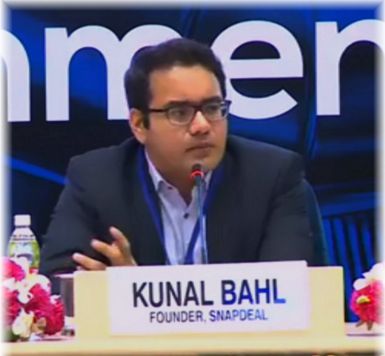
1:10 PM
The sixth session was ‘Celebrating Women: Stories of Innovative Women Entrepreneurs‘ – Shaili Chopra, founder of SheThePeopleTV takes the stage as moderator for the session

The Highlights:
- Sairee Chahal of SHEROESIndia: India produces the highest number of women graduates & we have high potentials for value creation.
- There’s been a 50% jump in women participating in Startup ecosystem in last 2 years.
- Shanti Mohan, founder LetsVenture: Women entrepreneurship needs to be more immersive in nature as it grows. Women need to be on all panels, and not just women entrepreneur panels.
- Nidhi Agarwal Of Kaaryah: A women-owned business that caters to women as a consumer is a very large white space to capture. The woman consumer is underserved in India today. I met 113 investors; our articulation & customer understanding improved along the way.
- Pranshu Bhandari of Culture Alley: As a woman, while raising funds, detach gender, ensure right product, and show commitment.
1:40 PM
This session was ‘Stand-up India, Launch Pad-presented by Google’– Ravi Gururaj, Founder & CEO at QikPod took to introduce the startups, who presented their business cases to the panel . The panellist included Rajan Anandan (VP & MD, Google SEA). 5 startups were shortlisted after an open invitation to ‘India-scale’ entrepreneurs. They pitched live at #StartupIndia.
Pitch 1: Kaalink Checking pollution levels in cities like Delhi. We’re giving the power to people to know the air quality in their environment.
Pitch 2: SlamdunQ: Uses smartwatches and smartBands to develop applications to improve sports performance
Pitch 3: Guru-G: Learning app to discover new teaching techniques. Provide in-class guidance to teachers on different ways in which they can teach a topic.
Pitch 4: Reap Benefit: Helping youth focus on and solve real problems in their neighbourhood. Has developed low cost solutions like water less urinals, weather stations, organic enzyme to convert food waste into compost and more.
Pitch 5: Cardiac Design Labs: We’re a full fledged cardiac diagnostic mobile solution. India has 64 Mn people with cardiac diseases, only 500K are operated every year
People’s Choice award was awarded to Guru-G. It marked direct entry to Google Launchpad week.
Grand Prize winner was awarded to Cardiac Design Labs. It won $100k in Google credits and direct entry to Google Launchpad week
2:25 PM
The seventh session was ‘How digitization will change India’s future’- a panel discussion moderated by Sanjay Vijay Kumar, founder, Startup Village. The panellists included Pranay Chulet CEO & Co-founder, Quikr; Deepinder Goyal Founder, Zomato; Saurabh Tandon Partner, Alpheas advisors; Pratyus Patnaik Co-founder, Appurify and Rajat Tandon Senior Director, NASSCOM (10k Start-Ups accelerator).
The Highlights
Rajat Tandon: (on social media helping to define policies) I dont think the kids today read the newspaper, they go to Twitter. On Facebook, you’re connected with communities. Your message is reaching a much farther audience. We’re encouraging startups to go to Tier 2 and 3 cities as well. We want entrepreneurs to get access to the technologies and an audience.
Deepinder Goyal: (On creating a need for the product) It’s should not be about creating a need, but a need should always be there. You need to find a latent need and make a good product which addresses it. If you’re creating a need for customers, then you have to force feed them that and it won’t go well with them.
Pratyus Patnaik: Apps sometimes amplify behaviours. It has certainly changed behaviour. The government has to partner for infrastructure, a lot of capital has to come from the government.
Sanjay Vijay Kumar: India does not have ton of grants, and it has to come from the government. As per government rules, you can’t take govt grants and be for-profit, and if you are non-profit, you can’t take private funding.
3:47 PM
This session included ‘Presentation on 8 lessons to entrepreneurs’- Speaker – Travis Kalanick, Founder Uber and Moderator – Deep Kalra, CEO Makemytrip.
The 8 lessons
- Adventure, doing the impossible is all entreprenership is all about!
- Selling & Storytelling, that is #AlwaysBeJugaading!
- Make magic! Do things which astounds people & makes them talking
- Perception & reality, an #entrepreneur makes them meet with innovation
- Be analytic but also creative
- How bad is the problem you are solving? Ask yourself
- Find a problem. We wanted to get a ride in Paris but couldn’t
- Find something broken, something that will be your passion
4:16 PM
The next session was ‘Disruptive Power of Technology in Financial Inclusion’ – Moderated by Sharad Sharma, co-founder iSPIRIT. The speakers included Vijay Shekhar Sharma Founder, Paytm; Abhishek Sinha CEO, Eko Financials; Kabir Kumar Senior Financial Sector Specialist, CGAP’s Digital Finance Plus (World Bank); Nitin Mehta MD, Atherton Capital; Karl Mehta Founder, EdCast; Sanjay Jain Platform head at EkStep.
The Highlights:
Kabir Kumar: India is one of the most exciting markets in the world for financial services innovation. There is around 20% of the unbanked population in the country.
Vijay Shekhar Sharma: Out of 100 million transactions (daily), more than half of them are going through Paytm. India will leapfrog plastic into digital money faster than any other country!
Abhishek Sinha: 50 years of payment patterns will get disrupted by digital in India. 100s of millions of Indians will have payment options available via smartphones.
Sanjay Jain: Aadhar API can be used by developers to build other services – India Stack.
Sharad Sharma: The next Uber from India will come in the financial sector.
4:35 PM
This session was on ‘The Funding Curve’ who had Nikesh Arora President & COO, SoftBank as speaker. Moderated by Srivatsan Rajan Chairman, Bain & Company New Delhi
The Highlights
- 18 months ago when we were discussing the strategy for investments, that coincided with the change of government and the smartphone revolution in the country. With Masayoshi Son’s experience in China, we could think of India as the best bet.
- Tip to Startup Founders: Stay focused on solving customer’s problem instead of money.

- What an investor wants to see – an entrepreneur working on a big problem, with a good business model and satisfied customers.
- 2015 was the year of tremendous funding – and a shakeout. 2016 will be the year of execution for Indian startups.
- I like the entrepreneurs whom I’ve to convince to take my money and not who’s convincing me to invest in his/her idea.
- One of the areas I’ve been interested in and where I haven’t seen skilled solution is education – there’s a huge amount of technology which can be applied here.
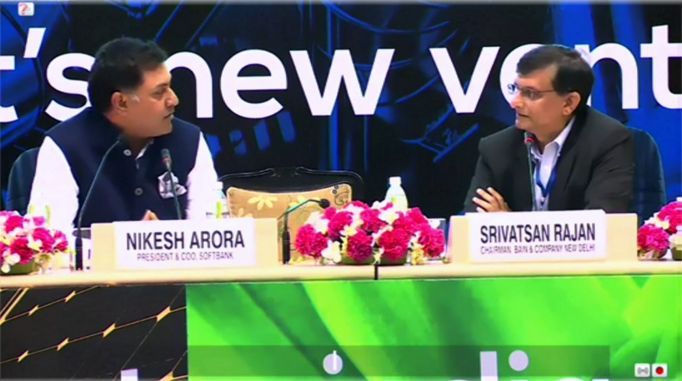
5:02 PM
This session was on ‘How do we capitalise entrepreneurship’ with speakers on platform like Sreedhar Prasad Partner, KPMG; Sachin Bansal Founder, Flipkart; Naveen Tewari Founder, InMobi; Radhika Agarwal Founder, Shop Clues; Ritesh Agarwal Founder, OYO Rooms; BJ Arun CEO, July Systems. Moderated by Jayant Sinha MoS Finance.
The Highlights:
Sachin Bansal: (On competitor raising money) if you don’t have a healthy business, money doesn’t come to you. As competition heats up in the market your expertise which fuels the growth needs to go up which needs capital.
Naveen Tewari: It’s very distracting to raise money. As a CEO and founder, you’re the only person who can raise money. So raise as much as you can. Just don’t relate it to your success. That’s the only caution you’ve to put.
Ritesh Agarwal: After Jan Dhan Yojana and Swachcha Bharat, today is our day. For someone like me, who come from a rural background in southern part of Orissa, at 22 years, it would have been impossible in any other country to build one of the largest hotel brands in the country and provide indirect employment to 40000 people.
6:00 PM
Finally Prime Minister Narendra Modi is on stage to launch the ‘Startup India, Standup India’ initiative! Founders of InMobi, Uber, Practo, Softbank etc. also on stage.
Prime Minister Narendra Modi
- PM cracks a joke about it being a Saturday and that too post work hours, and says that is the difference!
- PM says we have gathered startups to tell us what to do and what not to do.
- PM says startup founders are empathetic; they want to solve pain points of millions.
- PM says we need to bring about a psychological change from the job seeker mentality to job creator mentality.
- PM says government should not come in way of startups.
- PM announces compliance regime for startups based on self certification.
- Startups not to be subjected to inspection for the first three years.
- Starting a startup in one day will be made possible with a mobile app.
- Fast track mechanism for startup patent applications.
- Announces 80% rebate on patent filing for startups.
- Announces relaxed norms for public procurement of startups.
- Announces faster exit facility for startups, should be able to exit in 90 days. Will introduce Bankruptcy Bill 2015 towards this.
- Funding support through Funds of Funds for startups of INR 10,000 Cr.
- Also announces tax exemption on capital gains.
- Tax exemption on profits from startups for three years.
- Launches Atal Innovation Mission to boost incubators, provide seed capital to startups.
- Setting up 7 new research centres model like that of IIT madras.
- Innovation programs in schools to focus on 500,000 students.
- Will encourage startup fests in the country.































 Ad-lite browsing experience
Ad-lite browsing experience